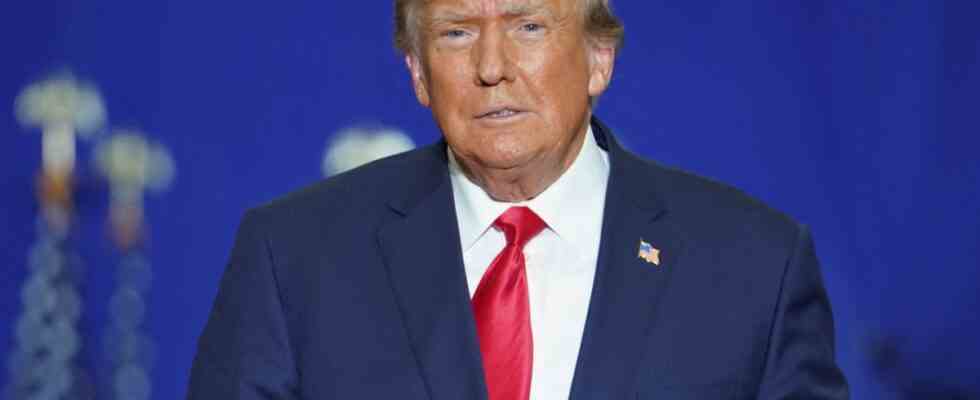Donald Trump is currently in a lawsuit mood. In principle, the former US President always is, but at the moment it is not just expressed in words, but in the fact that he is actively going to court. Trump had the station earlier this week CNN sued for alleged defamation for $475 million in damages. On Tuesday, he went to the Supreme Court to prevent the Justice Department from evaluating top secret documents that the FBI seized almost two months ago at his Mar-a-Lago golf club in Florida.
Of the CNN-Fall is no longer to be taken seriously, despite the enormous sum that is in the room. In the past, Trump has filed lawsuits against media outlets that he felt mistreated. Freedom of the press is very well protected in the USA, which is why these lawsuits usually come to nothing. Trump uses them primarily as a means of deterrence and intimidation. In the lawsuit against CNN it says, among other things, that the broadcaster’s reporting caused him “pain, humiliation and mental anguish”. Therefore, he is entitled to almost half a billion dollars.
The Supreme Court action is a bit more complex. In early August, the FBI seized 11,000 documents at Trump’s golf club, including classified papers that he should have handed over to the National Archives after his presidency ended. Despite repeated requests from the authorities, Trump refused, or rather: He only released part of the documents. He may have made himself liable to prosecution, among other things, he could have violated an espionage law.
A court in Florida ruled that the documents must first be reviewed by a neutral examiner. The Department of Justice should not investigate during this phase of the investigation. That was exactly what Trump wanted. The decision was met with astonishment in legal circles. The judge she met had been installed by Trump during his presidency.
As expected, an Atlanta appeals court overturned that decision. A neutral examiner will be used, a so-called special masters, but the Justice Department can continue to investigate and still have access to the 100 most secret documents. Trump’s lawyers are now arguing that the appeals court had no jurisdiction. Therefore, the Supreme Court should decide. However, it is not even clear whether the Supreme Court will even accept the case.
The 76-year-old Trump has survived dozens of lawsuits without significant damage over the course of his long professional life. However, the fact that he removed documents from the White House without authorization could actually have consequences for him. His calculus is apparently that the ultra-conservative majority on the Supreme Court could settle the matter in his favor.
The Supreme Court building in Washington, DC.
(PHOTO: STEFANI REYNOLDS/AFP)
Trump appointed three of the nine judges himself. The Conservatives outnumber the Conservatives by six to three, and what that means could be seen over the summer, for example, when the court overturned the nation’s right to abortion, which had been enshrined in the constitution for nearly half a decade, and ruled that it would henceforth be a matter for the States to decide about it.
The Supreme Court has been in session since this Monday after the summer break. There are some interesting cases in this session, though none as spectacular as the one the court used to overturn nationwide abortion rights. Since then, the Supreme Court has been under special scrutiny. Questions have even been asked about its legitimacy.
Presiding judge John Roberts took this as an opportunity to warn in a recent speech against questioning the court as a whole. Judgments have always been the subject of sometimes harsh criticism, and that is justified and appropriate. It is the Supreme Court’s job to say what the law is, and that job doesn’t change because people don’t like one or the other decision.
His colleague Elena Kagan replied, indirectly, in another speech. The court should exercise caution, especially with questions that are politically highly controversial, said the constitutional judge. Especially when the decisions on such issues were unequivocal and always in favor of one political camp. That was a clear indication that the conservative supermajority has recently shown that it is willing to fundamentally change life in the USA.
Groundbreaking cases are also pending in the coming session. Among other things, the court will decide whether the so-called “affirmative action” at universities is legal, i.e. whether universities should continue to be allowed to reserve certain quotas for minorities. This has been established law for decades.
Another important case involves a web designer refusing to work for same-sex couples for religious reasons. However, the court will not examine the question of whether this is covered by the right to freedom of religion, but whether it could be permitted because of the right to freedom of expression. If the court comes to this conclusion, according to some legal experts, it could mean that, for example, white supremacists could refuse services to black people (or vice versa). However, it is disputed whether this would actually be the consequence.
The first black woman in court: Ketanji Brown Jackson.
(PHOTO: KEVIN LAMARQUE/REUTERS)
In any case, it can be assumed that Judge Ketanji Brown Jackson will pay some attention to this particular case. She’s the first black woman on court, it’s her first session. Her numerous statements on her first two days made it clear that the Supreme Court had clearly gained in intellectual strength with her.

